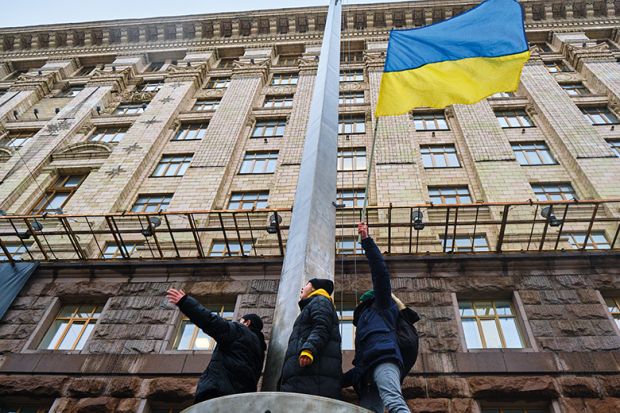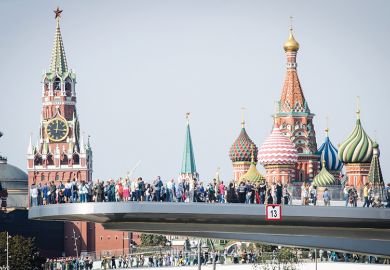“It is vital to remember how important to us all Ukraine’s success is in this horrible struggle. Our universities play a critical role on the path to victory. Their role includes state-building, free from ideology, nurturing active and engaged students as conscious citizens of the nation.”
There was real passion in the voice of Polina Hombalevska, president of the Ukrainian Association of Students, as she made the case for international help to allow Ukrainian students to continue their studies despite their universities’ shattered buildings and scattered faculty.
With Russia’s brutal war entering its third year, doubts emerging about continued Western support and Vladimir Putin smugly smiling at his marathon annual press conference like a cat biding his time to eat the canary, Hombalevska’s oration was a powerful reminder of why we all needed to stay the course.
The setting was the University of Lodz in Poland, just 250 miles from the Ukrainian border. The Magna Charta Universitatum, a consortium of international universities formed around 20 years ago to support free enquiry and institutional autonomy, had purposely chosen this location for its annual convention of university rectors and presidents so as to facilitate the participation of faculty, leaders and students from Ukraine and other nearby former Eastern bloc countries.
The theme of the 2023 event was the role of universities in regenerating cities and communities after devastating events: wars and natural disasters, but also the violent collapse of local industry and the jobs, pride and sense of identity that went with them.
In my address, I was happy to convey the US experience of universities as fulcrums for economic rebirth and new life in communities such as Pittsburgh and South Bend, Indiana. I also offered other international examples, such as Manchester, England, and the Ruhr region of Germany, identified through the transforming industrial heartlands initiative established by an international collaboration of thinktanks and universities.
Leaders of post-industrial communities often describe the massive economic dislocations they have undergone in vivid terms. I quoted Mayor Mike Bradley on the collapse of Sarnia, Ontario’s core chemical industry: “[It was] a brutal, even violent downturn. It was like something out of the Bible. [It] led to a lot of bitterness.”
But even that seemed insignificant compared with the reality – especially disturbing to a visitor from the US, where we have never experienced a war of such violence – that death and destruction was, even as I spoke, being rained on Ukrainian people and places that shared a common fabric of community with their Polish neighbours.
On the bus to one of the conference sessions, I talked with Oksana Zamora, a professor of international economic relations at Ukraine’s Sumy State University, who had fled the country as the Russians invaded. “It is so disorienting,” she told me. “I know what the Russians are doing. I know where they are killing and destroying my city and my friends. [Yet] here, life goes on as if nothing is happening.”
But what was also brought into vivid view at the three-day meeting was how many universities in Poland and beyond are doing everything possible to ensure that Ukrainian academic life can go on as if nothing were happening. Even with 1.5 million Ukrainian and 70,000 visiting foreign students displaced and 75 universities and 125 colleges partially or completely destroyed, such assistance is allowing Ukrainian faculty and students to keep classes open, if only virtually, and to keep research going through new arrangements and sponsorships for Ukrainian faculty.
At the same time, Russian-sponsored programming and academic “quality control” standards – which sought to force conformity with a Russian (or, arguably, a Putin) worldview and propaganda – are being jettisoned by Polish and European institutions and programmes.
It was a real reminder that the most powerful agents of change in the world are the individuals and the educated minds seeking to build the futures they want for themselves, their families and their countries. Putin’s invasion, including its assault on Ukrainian higher education, has only engendered a fierce and united front to preserve freedom of enquiry and freedom of expression at all costs, rejecting the fundamental tenets of Russia’s invasion.
With the military conflict stuck and reactionary US Republican Congressmen threatening to scupper continued US aid to Ukraine – not to mention the fact that the world is now distracted by the horrors of the Israel-Hamas war – it might seem as if Putin is winning. But what I saw in Poland was that he has already lost the battle for European hearts and minds.
It might take more time, but it is imperative that we all help buy the time to ensure that Putin’s version of an authoritarian state propped up by propaganda and violence ultimately collapses, leaving the young people of Ukraine and Europe free to build the future they want.
That was also Hombalevska’s plea. “Our universities’ role is to change our societies,” she concluded. “We need your help. Let’s do it together.” Amen to that.
John Austin is the former president of the Michigan State Board of Education and a non-resident senior fellow with the Brookings Institution.
Register to continue
Why register?
- Registration is free and only takes a moment
- Once registered, you can read 3 articles a month
- Sign up for our newsletter
Subscribe
Or subscribe for unlimited access to:
- Unlimited access to news, views, insights & reviews
- Digital editions
- Digital access to THE’s university and college rankings analysis
Already registered or a current subscriber?




